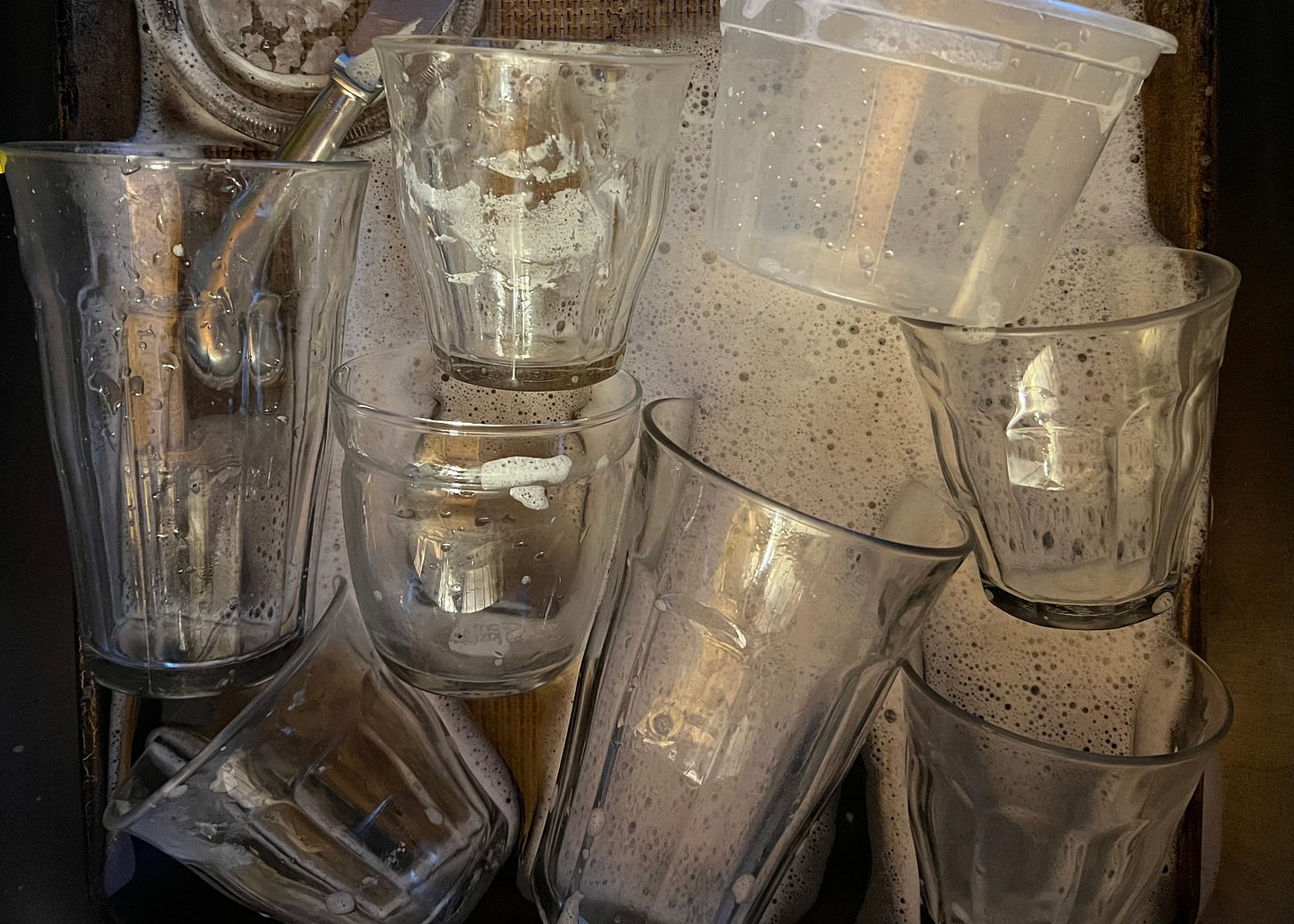Two Years of TV
Before we get to the TV, a brief moment for a legend. When André Leon Talley died on Tuesday, I thought of something Rachel Seville Tashjian wrote last October: “THERE ARE THOSE WHO BELIEVE THAT BEING ALIVE IS A WORK OF ART.” Talley was such a person, someone who thought nothing of showing up for breakfast looking like Zhukov defending Moscow. Tashjian clarified: “We’re talking about your actions, tastes and emotions all adding up to something greater, to a foundational, life-defining pursuit of beauty, of discomfort, of emotional heft (DRAMA!), of new and more ways of seeing and looking.” This is also Talley.
Tashjian just wrote a tribute to Talley for GQ. After that, read one of his several memoirs. You deserve it.
These are the TV shows we loved.
For the first few months of the pandemic, Heidi and I were podded here at home with her son, Sam. We spent a fair amount of time trying to figure out if we had covid toes. (We probably did.) There was a lot of strawberry ice cream in the house, not sure who kept buying it. Babylon Berlin was a superb way to start hiding inside the television every night. A vastly expensive German production, it stars two uncommonly beautiful people and digs slowly into the Age of Weimar. This pairs well with Berlin Alexanderplatz, if you have lots of free time (or there’s another lockdown). How did the Brownshirts do it? They pinned their violence on the Berlin Communists. DO YOU COMMIT TO ENDING FINSTA, and so forth.
Borgen is the next B show, about Danish government, and more specifically, the nature of parliamentary coalitions. Sidse Babette Knudsen plays Birgitte Nyborg, our centrist lib heroine, Pilou Asbæk (Euron Greyjoy to you) plays her media assassin, and Mikael Birkkjær plays Birgitte’s husband. Acting levels are way up there, but the most hallucinatory quality of this show is the idea that government might be anything other than organized crime.
The Bridge (Bron/Broen) was our third B. The main character is a Danish cop named Saga Norén, played by Sofia Helin. If I had to pick one performance from the last two years to save, it would be this. Though it is never mentioned, Norén is firmly on the spectrum, unable to read cues, recognize humor, flirt, or feel shame. (She changes into her leather pants in front of the other cops regularly.) Helin manages to convey a finely striated chunk of emotions while processing the idea of having emotions at all. Helin has two very different, amazing male leads to play off; the last season will wring you out. The Bridge also does a very grown-up thing and lets the show end when it ends.
And then the biggest B, Le Bureau. You need music cues to explain a scene to you? Not the show for you. You need your action pumped up to Bourne levels? Not the show. Spying, it seems, is agonizing and difficult and boring. Again, a show with some remarkably good-looking people, if you’re feeling shallow. I think about this show’s lack of manipulative techniques several times a week. Everyone looks lazy next to this show.
We were charmed by This Way Up, a British semi-comedy about two sisters, one of whom is in recovery (sort of). The comedy parts are a fig leaf, as this is really about sobriety and family, and is quite tender.
We struggled with Hacks for a few episodes, but Jean Smart is so magnificent we ended up on her team. Her co-star, Hannah Einbinder (Laraine Newman’s kid), bugs the hell out of me and almost sinks it. Smart wins.
You may have heard of Succession. We watched and rewatched it. Especially during the third season, you realize that verisimilitude may be important to the people scouting locations, but the action is in the genuinely inspired acting. The soap opera frame gives the cast lots of room to push each other. It’s a soccer match and a Freudian loop, though maybe now the kids understand that Logan doesn’t really love them in any practical sense. More helicopters than Apocalypse Now.
Industry is the younger sibling to Succession, if we’re assembling a family of hubris shows. The subjects are young finance monsters in London, a few of them Americans. Class, cocaine, anxiety. Exquisite.
We rewatched all of Game of Thrones. Fascinating how the actors campaigned for each other and almost eliminated rape and murder and nudity by the end of run. OK, not murder or nudity, at all. But the prurience was ratcheted down, which needs to be mapped against the overall id freefall that made the show so popular. I reckon the ice dragons filled in for some of the fantasy needs.
Another long engagement was The Americans, our second exhausting show about spying. Matthew Rhys: absolute gold. That is all. (A quick browse of this list will remind you that many actors in American shows are British.) TA also begins with lots of seggs and then ramps it down. Not as bloody as something like GOT but, good lord, some of the violent scenes are so, so disturbing. I will not describe them but: beware the empty suitcase. TA provides yet more evidence that spying is simply the worst job in the world. You end up believing in nothing!
You may have heard of The Beatles, the very famous documentary subjects. (Here is my review of Get Back for the Observer. It is my very strong opinion that much of the drama projected onto The Beatles is just that: a projection.) We adored Get Back, and it is important to point out that, though we fell back in love with John Lennon, The Beatles are maybe not what makes this series so satisfying. We would love any documentary that went hard for eight hours and let people do their jobs without being interrupted by talking heads, and allowed conversations to unfold without being goosed into confrontation by alcohol and editing. This may be a way of describing Frederick Wiseman’s work, so let this also serve as a reminder to watch City Hall.
Before we leave The Beatles, though, a few extras. I recommend Steve Albini talking with Vish Khanna about Get Back. Much more important than that, though, is the Beatles Anthology Revisited, a massive audio document put together somewhat mysteriously seven years ago. This user has posted all of the segments on his SoundCloud. What exactly is it? From this piece by Michaelangelo Matos: “Anthology Revisited is basically an extended audio-only remix of The Beatles Anthology, the multipart TV documentary that originally aired on Britain’s BBC and America’s ABC in November 1995.” The creator is anonymous, and the material is all taken from existing sources, the variety of which makes this work. How many times were The Beatles interviewed? So many more times than you think.
We didn’t care for these.
Counterpoint: J.K. Simmons trying bravely to make this sci-fi Cold War scenario hang together. He tries, and we love him, but no.
I Think You Should Leave + Baskets: Both shows are hung on the premise that the lead comic is best at his most unrestrained. Patti Harrison redeems the former, a few times.
How To With John Wilson: This follows the Gawker model of using something mundane as cover. With Gawker, run-of-the-mill reporting was the beard for being malicious creeps. With How To With John Wilson, roughly the same thing—standard news magazine subjects, like the prevalence of scaffolds in New York—is an excuse to let a fella ramble. Nope.
Toast of Tinseltown: Matt Berry is a god, and the original Toast of London is pure gold, but this unnecessary final season is just an excuse to use American comedians (Fred Armisen, Rashida Jones, Bill Hader) who can’t fit the Britishness of the show.
But what is the realest TV? TikTok, which is like all social media platforms boiled down and fed through public access cable. If you are resisting it, check your rejection. Do you sound like someone in 1964 dismissing The Beatles as teenage girl stuff? Just wondering.








